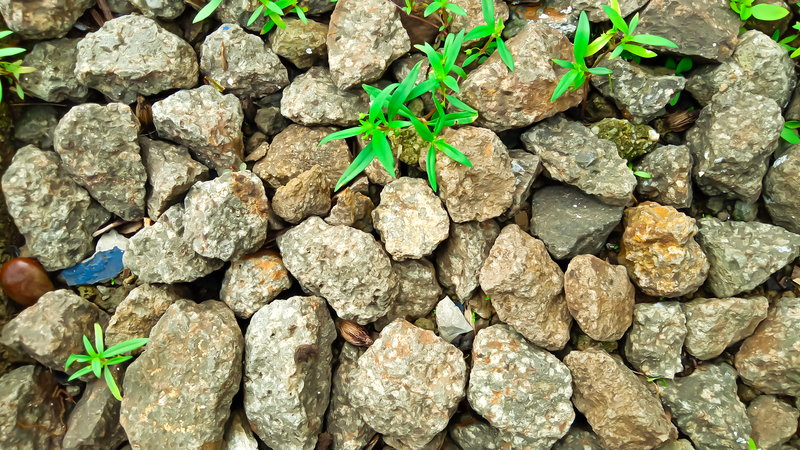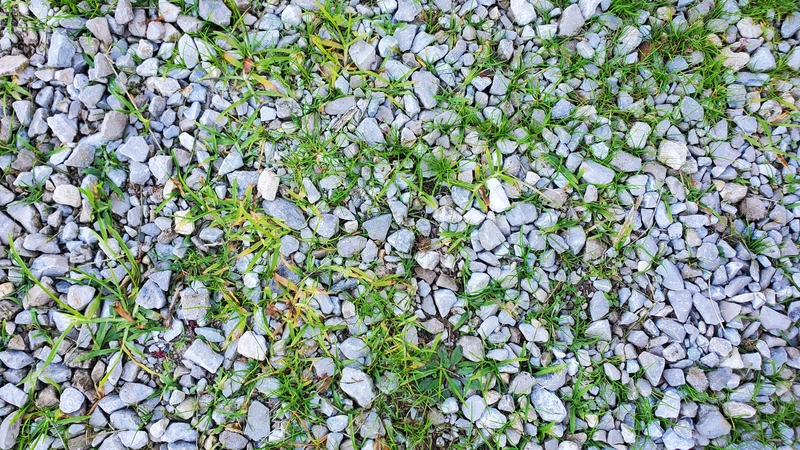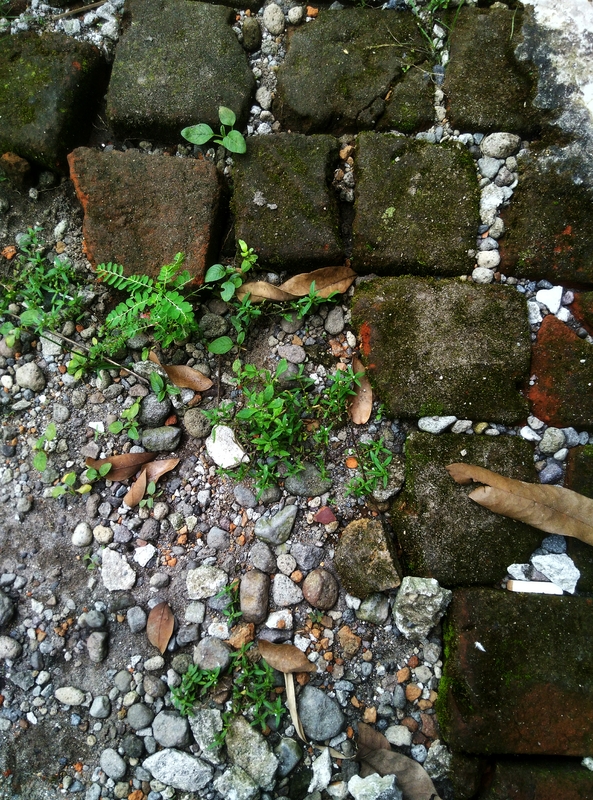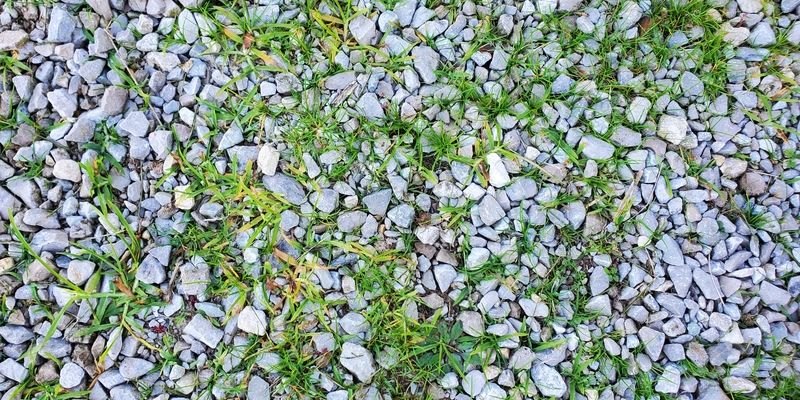
How to tackle weeds on a gravel driveway?
Blog
Are weeds taking over your gravel driveway? Weeds on gravel driveways can be a persistent and frustrating problem for homeowners. These unwanted plants not only detract from the aesthetics of your driveway but can also cause functional issues over time. From compromising the stability of the gravel to creating uneven surfaces, weeds can make your driveway less safe and more difficult to navigate.
Maintaining a weed-free gravel driveway is essential for both the visual appeal and functionality of your property. A clean and well-maintained driveway enhances the overall curb appeal of your home, creating a welcoming impression for guests and potential buyers. Additionally, a weed-free driveway reduces the risk of tripping hazards and damage to vehicles caused by overgrown vegetation.
In this guide, we will provide you with practical and effective solutions to tackle weeds on gravel driveways. Whether you prefer natural methods or commercial weed killers, we'll explore various techniques and preventive measures to help you reclaim and maintain a weed-free driveway. Say goodbye to those pesky weeds and enjoy a pristine and functional gravel driveway with the tips and insights we'll share in this guide.

The popularity of a Gravel Driveway
Gravel driveways have gained immense popularity in recent years due to several reasons. Firstly, gravel is a cost effective option compared to other driveway materials like concrete or asphalt. It is relatively cheaper to install and maintain, making it an attractive choice for homeowners as it can be purchased in bulk bags, making it a wise choice for buyers. It allows for hassle-free delivery and efficient storage and ensures you have an adequate supply of high-quality gravel for your driveway needs.
They are also known for their excellent drainage properties. They allow water to seep through, reducing the chances of pooling or flooding during heavy rainfall. Additionally, maintenance is relatively straightforward, with occasional raking and replenishing of gravel as needed.
Understanding the problem of weeds
As many homeowners will know, gravel driveways provide a dream driveway environment for several types of weeds to flourish. Here are some common weeds found on gravel driveways:
- Dandelion Known for its bright yellow flowers and fluffy seed heads, dandelions have deep taproots that can penetrate through the gravel and spread rapidly.
- Creeping Charlie: Also known as ground ivy, creeping Charlie is a low-growing weed with small purple flowers. It spreads quickly by sending out runners or stolons across the gravel surface.
- Chickweed: Chickweed is a small, low-growing weed with delicate white flowers. It thrives in damp conditions and can quickly take over a gravel driveway if left uncontrolled.
- Crabgrass: As an annual grass weed, crabgrass can quickly invade bare spots or thin areas in gravel driveways. Its ability to produce numerous seeds makes it particularly challenging to eradicate.
Why do weeds thrive on Gravel Driveways?
- Soil Residue: Over time, organic matter and debris accumulate in the gravel, creating a fertile layer for weed seeds to germinate and establish roots.
- Nutrient Availability: Gravel driveways may contain trace amounts of nutrients, which weeds can utilise for growth.
- Moisture Retention: Gravel can retain moisture, creating an ideal environment for weed growth, especially during rainy periods.
Weed removal be challenging
- Lack of Root Depth: Weeds often have shallow root systems, making them difficult to fully remove without damaging the gravel or leaving behind remnants that can regrow.
- Seed Dispersal: Many weeds produce copious amounts of seeds that can easily scatter across the gravel, leading to new weed growth.
- Persistent Growth: Weeds are resilient and can quickly rebound, even after removal. Their ability to regenerate from remaining root fragments or seeds further complicates the eradication process.
Why is it essential to remove weeds from gravel?
- Damage to Gravel: As weeds grow and expand, their roots can displace and loosen the gravel, causing uneven surfaces and potentially damaging the driveway's structure.
- Increased Maintenance: Weeds require ongoing removal and control efforts, resulting in additional maintenance tasks and potential expenses.
- Decreased Aesthetics: Weeds detract from the visual appeal of a gravel driveway, creating an unkempt and neglected appearance.
By understanding the types of weeds commonly found on gravel driveways, their thriving conditions, and the potential problems they can cause, you'll be better equipped to tackle the issue effectively and maintain a weed-free driveway.
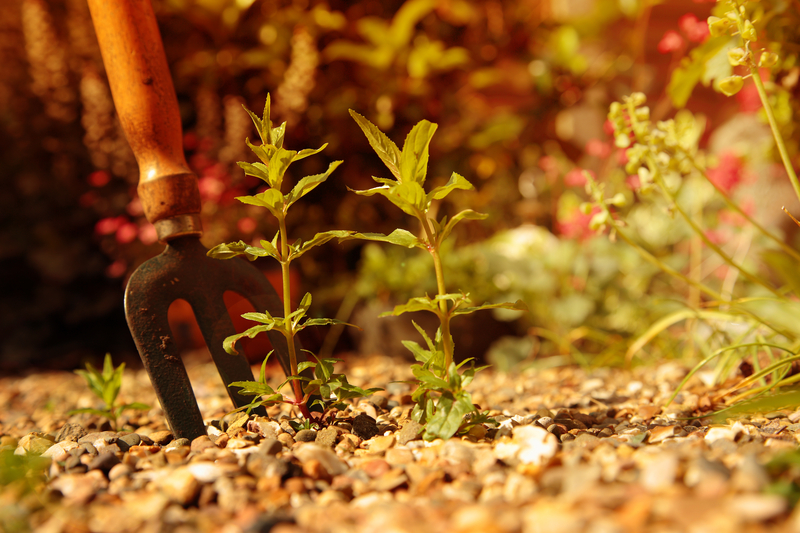
Control Methods for weeds
There are several categories of weed control methods that can be utilised to tackle weed problems in your driveway area. Let's take a closer look at what these are and what the benefits of each type is.
Natural Weed Control Methods:
When it comes to controlling and preventing weeds on gravel driveways, there are various natural and environmentally friendly methods you can utilise. These methods offer effective weed control while minimising the use of harmful chemicals. Here are some techniques you can employ:
Hand-Pulling:
One of the simplest and most straightforward methods is manually removing weeds by hand. Ensure you pull out the entire weed, including the root system, to prevent regrowth. This method is best for smaller areas or when dealing with isolated weeds.
Hoeing:
Using a garden hoe, scrape the soil surface to sever weed roots from the gravel. This method is effective for larger areas and can help disrupt weed growth. Be careful not to damage the gravel while hoeing.
Organic Mulch:
Applying organic mulch, such as wood chips, straw, or shredded leaves, can help smother weeds and prevent their growth. Spread a layer of mulch over the gravel, ensuring a depth of 2-3 inches. This will suppress weed germination and also provide additional benefits like moisture retention and soil insulation.
Vinegar Solution:
Create a natural weed-killing solution using household vinegar. Mix one ounce of generic dish soap with four-and-a-half litres of vinegar. Spray this solution directly onto the weeds, aiming to cover the foliage thoroughly. Vinegar acts as a desiccant, drying out the weeds and inhibiting growth. Be cautious when applying vinegar near desirable plants, as it can be harmful to them as well.
Boiling Water:
Boiling water is a simple and effective way to kill weeds without chemicals. Pour boiling water directly onto the weeds, ensuring it reaches the root system. This method works best for isolated weeds or those growing in cracks or crevices.
Commercial Weed Killers
Commercial weed killers can be an effective option for tackling stubborn weeds on gravel driveways. These products are specifically formulated to target and eliminate unwanted vegetation, providing a convenient and efficient solution. Here's some information on using commercial weed killers:
Choosing the Right Product
Selecting the appropriate weed killer depends on factors such as the type of weeds present, the size of the area to be treated, and any specific requirements or restrictions. Consider whether you need a selective herbicide (targeting specific weeds) or a non-selective herbicide (eliminating all vegetation). Read product labels and consult with experts at garden centres for guidance on selecting the right weed killer for your needs.
Application Techniques
Follow the instructions provided by the manufacturer for proper application. Typically, commercial weed killers come in liquid form and can be applied using a sprayer or a handheld applicator. Ensure uniform coverage of the weeds while avoiding excessive overspray onto desired plants or neighbouring areas. Take caution not to apply the product on windy days to prevent drift.
Timing
Apply weed killers when weather conditions are favourable. Ensure that it is not raining or about to rain, as this may dilute the effectiveness of the product. Additionally, avoid applying weed killers during periods of high heat, as it can cause the solution to evaporate quickly, reducing its efficacy.
Safety Precautions
When using chemical-based weed killers, it is crucial to prioritise safety. Wear protective clothing, including gloves, long sleeves, long pants, and goggles, to prevent contact with the skin, eyes, or inhaling the product. Keep children and pets away from the treated area until the solution has dried completely. Dispose of empty containers according to local regulations.
While commercial weed killers can be effective, it is important to note that they contain chemicals that may have environmental impacts. Consider the potential risks associated with their use and explore alternative natural methods, such as those mentioned earlier, if you prefer a more environmentally friendly approach.
Preventive Measures:
Implementing preventative measures is key to minimising weed growth on gravel driveways. By taking proactive steps and making sure the gravel and base have been laid directly, you can significantly reduce the occurrence of weeds. Here are some tips and advice:
Proper Drainage:
Ensure that your gravel driveway has adequate drainage to prevent water from pooling on the surface. Standing water can create a favourable environment for weed growth. Grade the driveway to allow water to flow away from the surface, or consider installing a French drain or gravel-filled trench along the sides to channel water away.
Regular Maintenance:
Regularly inspect and maintain your gravel driveway to catch any weed growth early. Pull out new weeds before they have a chance to spread and establish deep roots. Remove debris, leaves, and organic matter that can accumulate on the surface, as they can provide a suitable substrate for weed seeds to germinate.
Gravel Replenishment:
Over time, gravel driveways may experience erosion or wear, creating gaps where weed seeds can take root. Regularly replenish the gravel to maintain a thick layer, which helps hinder weed growth by blocking sunlight and reducing seed germination.
Landscape Fabric or Geotextile Barriers:
Consider using landscape fabric or geotextile barriers as an additional weed prevention measure. These materials act as a physical barrier, inhibiting weed growth by preventing weed seeds from coming into contact with soil beneath the gravel required space. Install the fabric directly over the prepared surface before laying down the gravel.
- Ensure the fabric is permeable to allow water penetration and airflow.
- Overlap fabric edges and secure them with landscape fabric pins to prevent weeds from finding gaps.
- Avoid overlapping fabric on the driveway's surface, as it can become visible over time and detract from the aesthetics.
It's important to note that while landscape fabric and geotextile barriers can be effective, they are not foolproof. Weeds can still find their way through gaps or establish on top of the gravel layer. Regular monitoring and maintenance are still necessary.
Ongoing maintenance is crucial to ensure a weed-free gravel driveway. Regular care and attention will help maintain the condition of the driveway and prevent weed infestations. Here's a checklist of tasks to incorporate into your maintenance routine:
Long-term solutions
- Regular Inspections: Schedule periodic inspections of your gravel driveway to identify any emerging weeds or areas that require attention. Aim to inspect the driveway at least once a month or more frequently during the growing season.
- Weed Removal: Remove any new weeds promptly by hand-pulling or using appropriate tools like a garden hoe. Ensure that you remove the entire weed, including the roots, to prevent regrowth. Pay special attention to cracks, crevices, and areas where gravel is thinning.
- Debris Removal: Regularly remove leaves, twigs, and other debris from the surface of the driveway. Organic matter can accumulate and provide a suitable substrate for weed growth. Use a rake or a leaf blower to clear the surface effectively.
- Gravel Replenishment: Periodically top up the gravel layer to maintain an adequate thickness. This prevents weed seeds from reaching the soil beneath and reduces the likelihood of weed establishment. Add new gravel as needed to fill in gaps and maintain a uniform appearance.
- Weed Control Methods: Continue implementing natural weed control methods discussed earlier, such as organic mulch, vinegar solutions, or boiling water, as necessary. These methods can be used as touch-ups or to address specific weed-prone areas.
- Address Drainage Issues: Monitor and address any drainage issues promptly. Ensure that water flows away from the driveway and does not pool on the surface. Redirect water if necessary, or consider installing additional drainage solutions like French drains or gravel-filled trenches.
- Landscape Fabric Maintenance: If you have used landscape fabric or geotextile barriers, periodically check for any gaps or signs of wear. Repair or replace sections as needed to maintain their effectiveness in inhibiting weed growth.
- Schedule Weed Control Applications: If you choose to use commercial weed killers, follow the recommended application schedule provided by the manufacturer. Regularly apply the product as directed to keep weed growth under control. Be mindful of any environmental impacts and consider alternatives if eco-friendliness is a priority.
Final Considerations
To achieve a weed-free gravel driveway, it's essential to take action and implement the strategies that best suit your specific situation. By regularly inspecting and maintaining your driveway, removing weeds promptly, and addressing any drainage issues, you can prevent weed infestations from taking hold.
Here at Henson Surfacing, we would love to help you achieve the perfect driveway for you. From concrete block paving to natural stone, gravel, and tarmac driveways, we can help create a new driveway for the focal point of your home. For your next cost effective solution, please contact us today with any queries and questions.
